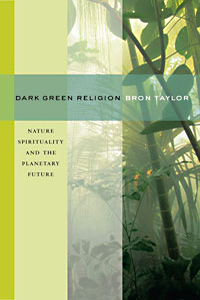DARK GREEN RELIGION:
NATURE SPIRITUALITY AND
THE PLANETARY FUTURE
RECOMMENDATIONS
Jonathan Benthall
author of Returning to Religion: Why a Secular Age is Haunted by Faith
author of Returning to Religion: Why a Secular Age is Haunted by Faith
A love of green may be a human universal. Deepening the palette of green scholarship, Bron Taylor proves remarkably to be both an encyclopedist and a visionary.
Donald Worster
Hall Distinguished Professor of American History, University of Kansas
Hall Distinguished Professor of American History, University of Kansas
Dark Green Religion shows conclusively how nature has inspired a growing religious movement on the planet, contesting the long reign of many older faiths. Taylor expertly guides us through an astonishing array of thinkers, past and present, who have embraced, in part or whole, the new religion. I was thoroughly convinced that this movement has indeed become a major force on Earth, with great potential consequences for our environmental ethics.
Stephen Kellert
Tweedy Ordway Professor of Social Ecology, Yale University School of Forestry and Environmental Studies
Tweedy Ordway Professor of Social Ecology, Yale University School of Forestry and Environmental Studies
The urge to find meaning and value through connecting with creation likely constitutes a deep and enduring human need. This important book provides insight regarding how a profound sense of relation to nature offers many in the modern world a vehicle for attaining this spiritual wholeness akin to what has been historically associated with established religion. In this sense, Dark Green Religion offers both understanding and hope for a world struggling for meaning and purpose beyond the isolation of the material here and now.
Dr. Claude Martin
Former Director General, World Wildlife Fund
Former Director General, World Wildlife Fund
A fascinating analysis of our emotional and spiritual relationship to nature. Whether you call it dark green religion or something else, Bron Taylor takes us through our spiritual relationship with our planet, its ecosystems and evolution, in an enlightened and completely undogmatic manner.
Peter H. Raven
President, Missouri Botanical Garden
President, Missouri Botanical Garden
In this thought-provoking volume, Bron Taylor explores the seemingly boundless efforts by human beings to understand the nature of life and our place in the universe. Examining in depth they ways in which the most influential philosophers and naturalists have viewed this relationship, Taylor contributes to the construction of sound foundations for the further development of thought in this critically important area, where our depth of understanding will play a critical role in our survival. This important book should be widely studied and will be greatly appreciated by those who take the time to savor its intellectual depths.
Professor Fikret Berkes
author of Sacred Ecology: Traditional Ecological Knowledge and Resource Management
author of Sacred Ecology: Traditional Ecological Knowledge and Resource Management
An excellent collection of guideposts for perplexed students and scholars about the relationships of nature religions, spirituality, animism, pantheism, deep ecology, Gaia, and land ethics -- and for the environmentalist seeking to make the world a better place through green religion as a social force.
Michael E. Zimmerman
Director, Center for Humanities and the Arts, University of Colorado at Boulder
Director, Center for Humanities and the Arts, University of Colorado at Boulder
In this exceptionally interesting and informative book, Bron Taylor has harvested the fruits of years of pioneering research in what amounts to a new field in religious studies: the study of how religious/spiritual themes show up in the work of people concerned about nature in many diverse ways. Taylor persuasively argues that appreciation of nature's sacred or spiritual dimension both informs and motivates the work of individuals ranging from radical environmentalists and surfers, to eco-tourism leaders and museum curators. I highly recommend this book for everyone interested learning more about the surprising extent to which religious/spiritual influences many of those who work to protect, to exhibit, or to represent the natural world.
Graham Harvey
author of Animism: Respecting the Living World (Columbia University Press, 2005)
author of Animism: Respecting the Living World (Columbia University Press, 2005)
Among the increasing number of books about religion and environmentalism, and in the context of increasing urgency about global climate change, Dark Green Religion stands out as a timely and necessary engagement with the more radical, less romantic, individuals and movements whose religious activities are primarily "for Earth first" and whose environmental activism is thoroughly religious. Here at last, we get beyond debates about which religion is greenest, and what religious resources might aid re-thinking human being in the world. We meet and are aided to understand people whose green religiosity is entangled with urgently serving the well-being of the larger-than-human community. Whether writing about religion or environmentalism, Bron Taylor proffers an important scholarly perspective on issues of vital interest.
Les Sponsel
Professor Emeritus of Ecological Anthropology, the University of Hawai'i
Professor Emeritus of Ecological Anthropology, the University of Hawai'i
Dark Green Religion is another groundbreaking scholarly product of Bron Taylor's pioneering research. He provides rich and fascinating information, interpretations, and insights into largely unrecognized as well as generally recognized aspects of religion and spirituality in relation to nature and environmentalism by applying broad and flexible concepts in pursuing Dark Green religion which he most appropriately characterized as bricolage. This wonderful book deserves a wide and diverse audience reflecting its original approach, scope, and aims. It has far reaching significance in helping to restore some modicum of ecosanity in a world far too often alienated from spirituality, nature, and their deep interconnections.


